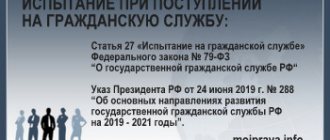One of the common violations by employers in Russia is evasion of the provisions of the law on a probationary period when hiring. Unscrupulous employers, taking advantage of candidates' ignorance of their rights, put them at a disadvantage. Sometimes the test is strictly prohibited by law, and in other cases, it is imposed with restrictions.
To be able to protect your rights, you need to know the provisions of the law on probation, which make it clear the meaning of the tests and the procedure for installing them.
Definition according to the Labor Code of the Russian Federation
The hiring test is regulated by Articles 70-71 of the Labor Code of the Russian Federation. The provisions do not disclose the exact definition of the concept, but, based on the “general spirit” of the articles, you can formulate it yourself:
A probationary period is a period during which the employer exercises its right to assess the employee’s abilities and decide whether he is suitable for the work assigned. To prevent abuse of this right, the employer cannot go beyond the law.
Attention! You cannot force an applicant to work during the “test” period. He must agree to this condition himself. However, in reality, it is difficult to find a vacancy without such a condition, so in a certain sense, obtaining consent from an applicant for the position is just a formality.
Purpose of the test
Passing the employee test has benefits for all participants in the labor relationship. By including this condition in the employment agreement, the employer gets an idea of:
- practical skills of the candidate for the position, his qualifications;
- his ability to perform assigned tasks in a team
- ability to adapt to a new environment;
- employee discipline.
Having correlated the information received with the requirements of the vacancy, the employer decides to continue or terminate cooperation with the applicant. Without such testing, it would be problematic to find out true information about a future employee, which means there would be a high risk of “missing the mark” with the choice.
For the applicant himself, passing the admissions test also has several advantages:
- He understands more clearly what he will do.
- He can assess whether he can cope with the load and whether his abilities meet the stated requirements.
- He will decide whether the work team is right for him.
If any items become unsuitable for the employee, he can always stop testing. If a probationary period were not assigned, and the applicant was immediately hired, he would have to work for 2 weeks before being fired. In this case, this period is reduced to 3 days.
Dismissal during probation period
The point of establishing a verification period is to check the professional qualities of the employee, and if they do not meet expectations, dismiss the person without unnecessary problems and restrictions. Some employers resort to a trick and conclude a separate special TD for this period. In essence, this is a fixed-term contract that does not have any legal basis for its urgency. But in this case, the duration of the inspection may be much longer than that allowed by law. This is a violation, and if the information gets to the regulatory authorities, the employer will be punished.
It is recommended to properly prepare dismissal during the probation period at the beginning of the employment relationship. To avoid appealing dismissal in court, you need to draw up a specific work plan for the first months during employment and bring it to the attention of the candidate:
- formulate and assign tasks to the employee;
- determine the dates by which the employee must acquire knowledge and skills;
- appoint someone responsible who will check and document the success of the newcomer;
- hand over the document to the new employee for signature.
When termination of a TD is initiated by the employer, the employee is given a notice of unsatisfactory performance, indicating the reasons. The notice period for dismissal is defined in Article 71 of the Labor Code of the Russian Federation and is only 3 days (the Labor Code of the Russian Federation does not specify whether it is working days or calendar days). Often, employers comply with the employee’s request to formalize his dismissal at his own request, since he does not want to have a record of dismissal in his work book under Part 1 of Art. 71 of the Labor Code of the Russian Federation, that is, he does not want to admit his professional unsuitability to other possible employers. When agreeing to this, it should be understood that the employee can change his mind and challenge the dismissal in court, even if it was made “on his own.” In this case, such wording can be harmful; the court will recognize a violation of the dismissal procedure, and the negligent specialist will be reinstated in his previous position. In addition, he will have to pay him compensation for forced absence. It is more rational to draw up all documents about the employee’s work results as they actually happened, and not to enter into any dubious transactions.
The first three probationary months of work, in addition to the difficult adaptation period, give the employee the opportunity to resign without working out within 3 days after writing a letter of resignation (the Labor Code of the Russian Federation also does not specify calendar or working days) if the job did not suit him or he did not cope. If the TD is terminated by an employee, it is enough for him to write a letter of resignation of his own free will. The employer has no right to retain an employee for more than three days.
By whom and how is it installed?
The probationary period is established at the initiative of the party providing the work. It can be assigned in 2 ways:
- When drawing up an employment agreement. The employer puts forward a condition for passing the test, the applicant accepts it, and the parties add a corresponding clause to the agreement. If the applicant refuses, and the employer insists on passing the verification period, the employment contract is not concluded.
- The employment relationship is concluded based on the fact that the employee performs the job functions assigned to him, but before that a probationary agreement has been drawn up. Then, no more than 3 days after admission to work, the parties enter into an employment contract. It includes a condition regarding the period during which the employee’s business and personal qualities are checked.
Reference! It is not possible to formalize an agreement to undergo an inspection “retrospectively”. If the employment contract does not contain a clause on this condition, it means that the employee is hired without going through it.
Compensation upon dismissal
According to the law, those resigning during the probationary period are entitled to two types of payments:
- Payment for work time.
- Compensation for unused vacation.
The amount of remuneration includes all bonuses and allowances that are paid to employees of the enterprise on the basis of its internal documentation. An employee can receive compensation for unused vacation in one of the following ways:
- monetary compensation;
- vacation days.
If the subject employee chooses to take a vacation before dismissal, then the work book and dismissal pay must be given to him before he goes on vacation. In most cases, employees resigning during a probationary period are not entitled to severance pay. The following situations are exceptions:
- staff reduction;
- liquidation of the enterprise.
Conditions of appointment
During the verification period, the employee is protected by labor legislation. He cannot be infringed on his rights or discriminated against for any reason. To protect against violations by the employer, he has all the tools guaranteed by labor legislation to “ordinary” employees.
During the trial period, all employee responsibilities are specified in the employment contract and/or job description. Management does not have the right to demand that an employee undergoing a probationary period perform functions not included in the documents.
Legislative framework
The employment contract must contain a clause on the completion of a probationary period (PP) indicating its duration. Read here about whether it is necessary to draw up an employment contract during a probationary period, and from this article you will learn about registering IP in a fixed-term and permanent employment contract.
If the company has been in existence for more than a year, then it usually develops its own specific algorithm for checking new employees during the trial period. For this purpose, the management is developing a special regulation.
The Labor Code establishes certain categories of workers for whom it is prohibited to introduce a probationary period:
- pregnant women;
- young people under 18 years of age;
- specialists who are registered in the order of transfer, those who entered by competition and some others.
What is the regulation on the procedure for passing the IP?
This document describes in great detail the general provisions on the procedure for passing the verification period and specifically describes the procedure itself.
- The tasks and goals, the criteria by which the subject will be assessed, are indicated.
- The terms and reasons why it is possible to reduce them are determined (its duration cannot exceed 3 months - Article 70 of the Labor Code of the Russian Federation).
- A curator is appointed and an individual plan is drawn up for the period of professional suitability testing.
- The procedure and deadline for reporting test results is prescribed.
Start
The probationary period always starts from the very first working day . It is impossible to install it if a person has already worked at the enterprise for some time (at least for a few days).
How long can it last
The length of the probationary period is limited at the federal level. Deadlines vary:
- for “ordinary” workers and management;
- for those concluding an employment contract on a “permanent basis”;
- for persons planning to work under an agreement for a short time (from 2 to 6 months).
Important! If an employee is absent (even for a good reason - illness), then the probationary period is suspended. Only time actually worked is counted.
Maximum and minimum
In order to prevent abuse by employers, as the stronger party in the employment contract, the legislator determined the maximum possible duration of the tests:
- Up to 3 months – for ordinary employees.
- No more than 6 months – for heads of organizations (structural divisions) and their deputies, as well as for chief accountants and their deputies.
- Up to 14 days – for employees with whom a short-term employment contract is concluded (from 2 to 6 months).
The minimum period for passing the inspection is not established by law. If 1-2 days are enough for the employer to “get to know” the employee, then after these days a decision can be made. In practice, such a short period does not occur.
Excess or early termination
Extending the probationary period is a controversial measure on the part of management. It is not directly provided for by labor legislation. When considering disputes related to the extension of the period for checking the business qualities of an employee, the courts take one of two positions:
- Recognize exceeding the term as illegal, since the law says that the probationary clause is included in the employment contract at the time of its conclusion.
- Resolve the dispute in favor of the employer and recognize the extension as legal on the basis of a general rule that provides the opportunity to change the employment contract at any time by agreement of the parties.
Reference! The employer cannot extend the period without the consent of the employee. He also does not have the right to dismiss an employee who has passed the initially established period of testing. If this does happen, it makes sense to go to court; it may take the employee’s side.
With the early reduction of the test period, everything is clear, since it does not infringe on the rights of the employee. The same applies to termination of the trial before the expiration of the period specified in the agreement. The opportunity to terminate an employment contract without waiting for the end of the test period is provided for in parts 1 and 4 of Article 71 of the Labor Code of the Russian Federation.
The right is granted to both parties, subject to certain nuances. The initiating party must notify the other party in writing of the termination of the agreement at least 3 days in advance. And the manager also undertakes to list the reasons why this employee is not suitable for him.
Attention! If the reasons seem “far-fetched”, there are no documents confirming the employee’s incompetence, violation of labor regulations, etc., then the employee has the right to go to court to restore violated rights.
What to do if you do not agree with dismissal during the probationary period
If you fail to fulfill your responsibilities, the employer may terminate the employment contract. He must report this at least three days before dismissal in writing and indicating the reasons. There is no severance pay provided, but days of work must be paid.
The Labor Code does not define in any way the reasons why you may be fired during the probationary period. The employer himself assesses whether the employee has coped with his responsibilities. However, this does not mean that you should agree if his explanations seem far-fetched. You need to go to court within a month of the Labor Code of the Russian Federation Article 392. Time limits for applying to court for resolution of an individual labor dispute from the date of dismissal, and the employer will have to prove that you worked poorly.
You, for your part, can find evidence of good work and, also an option, violations on the part of the company. For example, if you were told about your dismissal on the last day of your probationary period, this is a violation.
If the court sides with you, you will be reinstated or your employment record will be changed to “dismissed at your own request” - as you wish.
Probationary period depending on the job
There are certain types of work for which tests have some specifics. It consists of increasing/reducing the maximum duration of the employee evaluation period. Some non-standard categories:
- Chief accountants, heads of organizations. The competence and professionalism of these employees is difficult to assess in the short term. Therefore, the legislator increased the maximum limit for the evaluation period of management personnel to 6 months.
- Seasonal workers. The specificity of relations with applicants for seasonal work is a short period of labor relations (from 2 to 6 months). Therefore, it is not advisable to evaluate the qualities of employees over a period of 3 months, as with ordinary candidates. Because of this, for the category of seasonal workers, the period for checking professional qualities has been reduced to 2 weeks.
- Young professionals. The social state is obliged to provide equal opportunities to both professionals and graduates of higher and secondary specialized institutions. Therefore, the legislator allocated a preferential place for young specialists, who often do not even have work experience – hiring without testing.
Reference! The law classifies as beginning specialists graduates of secondary specialized and higher institutions who have completed educational programs that have state accreditation. The benefit for hiring without testing is valid once within a year after completion of training.
Registration procedure
Testing of an employee’s professional qualities is necessarily reflected in the employment contract. A separate clause stipulates that the employee is subject to a probationary period. Its duration is indicated.
Attention! An entry about the appointment of the test is not made in the work book.
If the employment contract does not specify the conditions for establishing a test period, then the employee is considered hired by this employer without fulfilling it. If such a condition is included in the hiring order, but is not specified in the contract, it is also not valid.
At the end of the trial period, the employee is often asked to fill out a form by answering questions similar to the following:
- What were the difficulties, and were you able to overcome them?
- Which tasks were completed and which were not, and why.
- What information was new to the employee.
Such forms help management decide whether to continue cooperation with the candidate or not.
End of test
Certification at the end of this time period is perhaps the most ideal option for completing it. That is, a new employee undergoes exactly the same test (suitability for the position) as everyone else, according to the certification regulations developed in the organization.
When does it end?
This period is considered completed when the time period established for the IP ends (it is indicated in the employment contract).
results
The results at the end of this test may be positive or negative . Well, of course, a negative result is much less common, because usually already in the first 3–4 weeks it becomes clear whether a person is coping with the assigned tasks or not. Therefore, more often than not, they part with an unsuitable employee who just doesn’t work out earlier.
Attention! If during the testing process the employee realizes that this place is not suitable for him, in order not to waste time, he must notify the employer 3 days in advance (in writing) and resign of his own free will.
Report
The most important document is the completion report , which is prepared after the tests are completed. It precisely reflects the employee’s ability to perform his job duties.
- Who writes?
The report is usually compiled by the curator assigned to the subject. - How to compose it?
It is not difficult to write a report; it must strictly correspond to the specific test plan developed earlier. It should be described in detail, for each task set in the plan - how it was completed, what mistakes were made, how they were corrected. It is convenient to use a point scale in such a report; it will look more objective. - During what period?
The report must be ready no later than 2 weeks before the end of the verification period.
Characteristic
After the testing period, the employee’s character reference is drawn up by his immediate supervisor. It reflects not only his business qualities, but also his ability to work in a team, mobility, social adaptation, level of culture and stress resistance. This characteristic is then attached to the report (based on test results).
Conclusion about the passage
The conclusion is already the final document; it is prepared on the basis of the two previous ones (report and characteristics) . This document analyzes and summarizes all the results of labor activity during the designated period.
An example of a probation report can be downloaded below:
This conclusion is most often prepared by a HR specialist or one of the new employee’s experienced, qualified colleagues.
How is it paid?
In the Labor Code of the Russian Federation, the probationary period does not differ from regular working hours. Therefore, it is subject to appropriate payment. Like other employees, a probationary employee’s salary depends on:
- his qualifications ;
- the amount of work performed and its complexity ;
- the quality of the work done.
Also, an employment contract has already been concluded with employees of this category. And it must indicate working conditions, including the amount of payment.
Reference! The salaries of persons on probation and those who have completed it cannot differ, provided they perform the same work.
Different rules are established regarding bonus payments. The employer’s local regulations may stipulate that bonuses are paid only to employees with a certain length of service. In this case, the “newbie” is not entitled to additional payment.
If an employee fails the hiring test, he does not lose his wages. He can receive payment on the day of dismissal.
Is the probationary period included in the length of service that gives the right to leave?
The right to annual paid leave for the first year arises only after six months of continuous work with a specific employer (Article 122 of the Labor Code of the Russian Federation). The vacation experience includes the time of actual work. And during the probationary period, the employee is subject to all provisions of labor legislation and local regulations.
Since the probationary period is not included among those periods that are not taken into account when calculating the length of service for the provision of paid leave (Article 121 of the Labor Code of the Russian Federation), it turns out that this period is included in the length of service for leave.
Who does not apply to?
Part 4 of Article 70 of the Labor Code of the Russian Federation lists categories of citizens who are exempt from testing when applying for a job. These include:
- persons who passed a competitive selection for the relevant position or were elected to it;
- graduates of universities and secondary vocational institutions who have completed educational programs that have state accreditation. Moreover, they must enter work for the first time, in the year in which they graduated from the educational institution;
- pregnant women, women with a child/children whose age does not exceed 1.5 years;
- minor citizens;
- persons transferred to work for another employer (by agreement of enterprise managers);
- persons who enter into an employment contract for a period of less than 2 months.
Among other categories of citizens who are provided with benefits are:
- persons who have successfully completed an apprenticeship in a specific company and enter into an employment contract in the same company;
- persons who have successfully completed sports training under sports training contracts and who have decided to enter into an employment agreement with the contract customer.
Attention! The lists provided are not exhaustive. Beneficiary groups may be supplemented by law or collective agreement.
To whom, according to Part 4 of Art. 70 of the Labor Code of the Russian Federation is it impossible to establish a test when hiring?
In accordance with Part 4 of Art. 70 of the Labor Code of the Russian Federation, certain categories of employed persons cannot be subject to a probationary period. Thus, the Labor Code in Art. 70 determines that the employer does not have the right to impose a condition on checking the qualities of a newcomer in an employment contract:
- for pregnant women and mothers with young (under 1.5 years of age) children;
- employees selected on a competitive basis to fill a position;
- young specialists who have recently (within 1 year) completed their studies under a state program at a vocational school or university, if this is their first place of work in their specialty;
- minors;
- persons elected to an elective position with an agreed salary;
- those employees who were invited under the terms of transfer from another company;
- workers employed for a period of less than 2 months.
Admission without probationary period
The test period is not mandatory for hiring, so the employer can hire without assigning an IP.
In this case, the employee begins to perform work duties from the date specified in the agreement.
If an employee is hired without a trial period, then he cannot be removed from work for reasons not directly specified in the Labor Code. The employee retains the right to resign at his own request. However, you will need to notify your boss about this in advance - 2 weeks. This period will need to be worked out (provided that the employee is not on vacation or sick leave).
How to register and extend the probationary period
The law does not indicate how to prescribe a probationary period in an employment contract; the Labor Code of the Russian Federation does not contain ready-made wording. In practice, the phrase is used: “In order to test the employee’s qualifications and professional qualities, a trial period of 3 (three) months is established.” It is permissible to use a form in which such a condition is indicated and to enter a specific duration of the period.
Extension of probation beyond the established time under the employment contract is prohibited by the Labor Code. But what if a short verification period was initially set, is it allowed to extend it? The Labor Code of the Russian Federation does not provide for such a possibility; they establish an inspection period only when concluding a TD (Parts 1, 2, Article 70 of the Labor Code of the Russian Federation). Extension means establishing a test for an already working person and revising the terms of the contract in the direction of worsening the worker’s situation. A reduction in the trial period is permitted.
Legal extension is allowed only for the period of absence of the employee from the workplace due to illness or other reasons (Article 70 of the Labor Code of the Russian Federation).
It is most advisable to conclude an employment contract with a probationary period for a maximum period. If the first months are successful, it can be reduced. This is easier to do than to increase. Here is an example of the wording:
A TD was concluded with the seller Vorobyov, the trial period is 3 months. During the work, the parties agreed to reduce the inspection time to 2 months and signed an additional agreement to reduce this period.
This method does not worsen the employee’s position and is therefore acceptable in practice.
Rights and obligations
During the test period, the employee is granted all the rights of an ordinary employee. Among them: the right to wages, safe working conditions, etc. Responsibilities are prescribed in the employment contract, established by labor legislation and local regulations of the employer. If necessary, a liability agreement is concluded, as with other employees.
The employer's specific rights include 1 point: dismissal of an unsuitable candidate under a simplified scheme. You only need to justify the reason for dismissal and notify the employee in writing of termination of the contract no later than 3 days in advance.
In relation to an employee on probation, management more actively exercises the following rights:
- Supervises the quality and timing of work.
- Records the results of the employee performing the functions assigned to him.
- Requires him to report on the work done, and if the performance is unsatisfactory, an explanatory report.
The main responsibilities of the employer include fulfilling the rights of the employee. In relation to an employee on a probationary period, the employer has an additional obligation - to document the grounds for dismissal. To do this, disciplinary offenses and shortcomings in work must be indicated in writing. Without them, refusal to continue working with the employee will be illegal.
How is work paid during the probationary period?
Job descriptions often indicate a low salary and promise to increase it after a probationary period. This is so common that it seems logical and obvious: the employer is just getting to know the person and does not want to pay him in full.
But this is illegal. The Labor Code prohibits the Labor Code of the Russian Federation Article 132. Payment for labor discrimination in determining wages. For example, in Nizhny Novgorod, the prosecutor's office fined a joint stock company for discrimination against employees and brought the company to administrative responsibility for the fact that employees on a probationary period received 30% less than colleagues in similar positions. The department considered that the employer should have paid equal pay for equal work. And this is far from the only case.
Useful video
The Labor Code of the Russian Federation strictly regulates the conditions and procedure for passing the test when applying for a new position. The employer cannot set a trial period for a period longer than 3 months (for managerial vacancies - more than 6), and for short-term employment contracts - more than 2 weeks .
After the specified period, the employer is obliged to make a decision on how successfully the test was passed. In case of an unsatisfactory assessment, the contract with the applicant is terminated. If the employee continues to perform duties, he is considered to have successfully completed the trial period and accepted a new job.
Results
Article 70 of the Labor Code of the Russian Federation contains rules according to which, during employment, the employer can establish a check for a new employee for a limited time. This probationary period according to the Labor Code in 2021 cannot be more than 3 months (and for managerial positions - 6 months). If the work is supposed to be short-term (from 2 months to six months), then no more than 2 weeks. And if the employment period does not exceed 2 months, then the probationary condition cannot be specified at all.
At the end of the probationary period, the employer must decide whether the employee is suitable for him or whether he needs to be fired.
If the employee continues to work after completing the test, then he is considered hired. You can find more complete information on the topic in ConsultantPlus. Free trial access to the system for 2 days.










